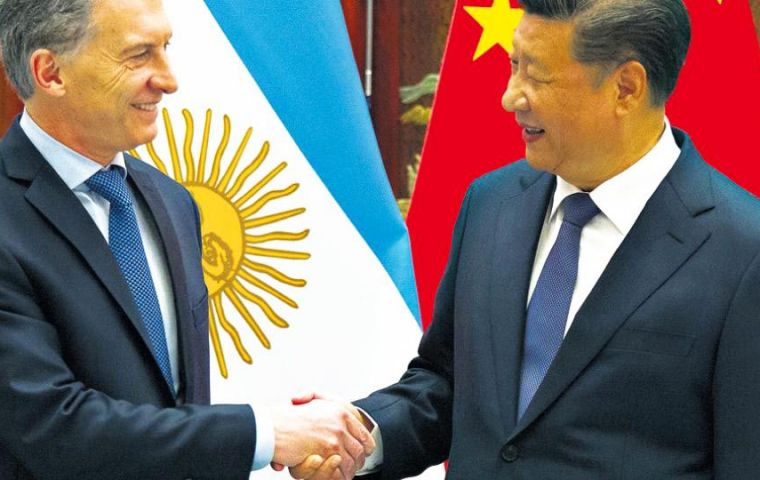MercoPress. South Atlantic News Agency
China and Argentina ties increasingly closer
 China proposed an expansion of the currency swap deal with Argentina, whose foreign reserves have been drained by interventions aimed at propping up the peso
China proposed an expansion of the currency swap deal with Argentina, whose foreign reserves have been drained by interventions aimed at propping up the peso China's offer of financial support to Argentina is the latest example of the Asian nation filling a vacuum in what has traditionally been the backyard of the U.S. While President Donald Trump has not paid a visit to Latin America since his inauguration in January 2017, China has stepped up its financial assistance to Argentina and worked to strengthen their trade ties.
China even appears intent on including the South American country in its Belt and Road infrastructure initiative.
The two sides have begun discussing an expansion of a currency swap agreement under which they loan funds to each other in times of financial turmoil, Argentine cabinet chief Marcos Pena said in an interview published by the Financial Times last month. Pena said that he wishes to expand the agreement with China.
The current agreement, which allows for exchanging up to 70 billion Yuan (US$ 10.3 billion) of one country's currency for the other, was extended for three years in 2017. It is widely believed that China proposed an expansion to Argentina, whose foreign reserves have been depleted by dollar-selling interventions aimed at propping up the peso.
Argentina is currently receiving assistance from the International Monetary Fund to deal with a sharp weakening of its currency.
Chinese President Xi Jinping and Argentine President Mauricio Macri exchanged letters in mid-May. Xi called for taking the two nations' comprehensive and strategic partnership to the next level, and Macri responded that Argentina will fully support joint construction under China's Belt and Road Initiative.
Soon afterward, Argentine Agriculture Minister Luis Miguel Etchevehere visited Beijing and signed an agreement that lifted China's ban on imports of fresh beef from Argentina. As beef is one of Argentina's key exports, negotiations on the matter picked up after Macri visited China in May 2017.
Communist Party-led China had been close to the leftist administration of Macri's predecessor, Cristina Fernandez. Around the time Macri took office in December 2015, he suggested that Argentina would distance itself from China, questioning the lack of transparency in agreements signed by Fernandez over construction of power plants. But Macri is gradually finding it hard to turn down offers from the Asian economic power.
The two leaders met again in South Africa during the recent BRICS summit.
Local news site Infobae reported on July 10 that the two countries are in talks toward joint production of military planes, ships and other assets, citing an official in Argentina's foreign ministry.
Beijing's ambitions in the region go beyond just Buenos Aires. It has expressed an interest in forging a free trade agreement with Mercosur, the trade bloc that includes Argentina, Brazil, Paraguay and Uruguay.




Top Comments
Disclaimer & comment rules-

Read all comments”Around the time Macri took office in December 2015, he (questioned) the lack of transparency in agreements signed by (the CFK government) over construction of power plants.”
Aug 01st, 2018 - 05:43 pm -1Amazing! Macri discovers the wonders of pragmatism in economic matters as the US abandons its world leadership pretentions and China moves in to fill the void.
Let's hope future contracts are as transparent as much as Macri said they should be.
Commenting for this story is now closed.
If you have a Facebook account, become a fan and comment on our Facebook Page!